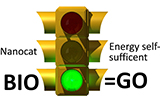Fuels from renewable bio-oils and biogas - EU-Project BIOGO with focus on nanocatalysis started

The European commission launches a new large scale collaborative research project entitled BIOGO-For-Production that aims to achieve a step change in the application of nanocatalysis to sustainable energy production through an integrated, coherent and holistic approach utilizing novel heterogeneous nanoparticulate catalysts in fuel syntheses. A consortium of 15 partners from 7 countries will carry out this ambitious project during a 4-year research program, the results of which will have substantial strategic, economic and environmental impacts on the EU petrochemicals industry and on the increasing use of renewable feedstock for energy.
BIOGO researches and develops advanced nanocatalysts, which are allied with advanced reactor concepts to realize modular, highly efficient, integrated processes for the production of fuels from renewable bio-oils and biogas. Principal objectives are to develop new designs, preparation routes and methods of coating nanocatalysts on innovative micro-structured reactor designs, enabling compact, integrated catalytic reactor systems that exploit fully the special properties of nanocatalysts to improve process efficiency through intensification. An important aim is to reduce the dependence on precious metals and rare earths. Catalyst development is underpinned by modelling, kinetic and in-situ studies, and is validated by extended laboratory runs of biogas and bio-oil reforming, methanol synthesis and gasoline production to benchmark performance against current commercial catalysts.
The 4-year project culminates in two verification steps:
(a) a 6 month continuous pilot scale catalyst production run to demonstrate scaled up manufacturing potential for fast industrialization
(b) the integration at miniplant scale of the complete integrated process to gasoline production starting from bio-oil and bio-gas feedstocks.
A cost evaluation will be carried out on the catalyst production while LCA will be undertaken to analyze environmental impacts across the whole chain.
This €9m European funded project was launched in December 2013 and has a term of 48 months. The Project Coordinator is Fraunhofer ICT-IMM (GERMANY).
This project has received funding from the European Union’s Seventh Framework Programme for research, technological development and demonstration under grant agreement no 604296.
 Fraunhofer Institute for Microengineering and Microsystems IMM
Fraunhofer Institute for Microengineering and Microsystems IMM